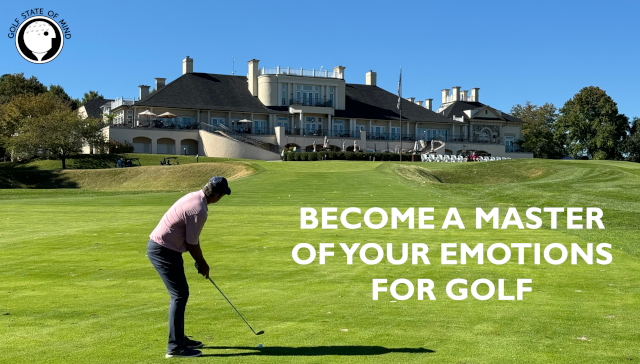
Master Your Emotions For Golf
The train of negative thoughts and unwanted emotions can arrive into the station of our mind and body at any time, but we don’t need to climb aboard. If you don’t master your emotions for golf, there’ll be an interplay of these thoughts and emotions making them bigger, leading to an inability to think clearly and create tension in your body. This can then mean that you fail to reproduce the great shots you saw just hours or days earlier. In other words, you will be prevented from being your best performing self.
Over the past 15 years, I’ve studied mental and emotional management and its effect on an athlete’s performance. What I’ve concluded is that everyone is different in what can help adjust their inner state – it’s a matter of self exploration and experimentation to see what works best. To help you with this, here are my top 5 ways to conquer negative thinking and unwanted emotions.
Self Talk and Affirmations to Master your emotions for golf
The mind can tell us things that aren’t true or it can focus on what we don’t want to happen i.e., the things we fear or the doubts we have about our ability. To counter this, we can use our inner voice – which can serve as a positive distraction from these thoughts and a powerful emotional regulator. There are countless studies in Sports Psychology journals which show that Self Talk for golf (which can be “Motivational” and “Instructional”) improves performance. But it’s not that simple. An athlete or golfer needs to carefully curate and test their own self talk scripts and affirmations.
You can displace negative thoughts and master your emotions for golf by repeating “Affirmations” in your head, or out loud. Affirmations are carefully chosen “trigger” words – words that you have an emotional connection with i.e. hearing them makes you feel something. Saying these words can help you move away from what’s negative in your mind and instead, focus on words that make you feel “Strong”, “Powerful”, “Grateful”, “Composed”, “Dominant”, etc, or whatever you would like to be feeling in those moments.
Acceptance and “Non-Attachment” to Master Your Emotions for Golf
Developing the skill of Acceptance is a key part of high performance golf but many players struggle with it. To begin with, let’s clarify a common misconception – that acceptance is the same as approval or complacency. Because you accept something, it doesn’t mean that you don’t care or that you approve of what just happened. Simply put, it’s the best thing to do to be able to move on from setbacks in a round and improve your position.
Take the example of missing a short putt, which is an event that can trigger high emotion for most players. When I talk to players about being able to accept this, they tell me that it’s hard to do because they find it so “unacceptable”. So let’s establish exactly what is meant by acceptance and how important it is to become your best.
When you experience missing a short putt or 3 putting a birdie opportunity, there will be emotions that are immediately triggered, a, because you are human and b, because you care. Because so-called negative emotions are triggered, we start thinking negatively and perhaps talking to ourselves in a critical way. We start to ruminate about what happened which keeps us in those thoughts and emotions, making it harder for us to pull ourselves out of them. Great athletes also feel strong emotions like the rest of us, but they can come out of them quickly by being a master of their emotions for golf.
Acceptance is a better approach which dissolves these thoughts and emotions quickly. Instead of getting caught up in them, we just sit with them until they pass through us. I.e. We are present to what we are experiencing now, not stuck in the past or thinking about how that mistake will impact our future. When you accept, you become an observer of the experience not a judge. Ask yourself: “What am I feeling now and where do I feel it?” This sounds easy, but it’s not. Creating a pause in moments of stress takes practice, but it’s achievable and it will help you bounceback.
In the same way that we want to accept what has happened in the past, we also benefit from (pre)accepting what might happen in the future. Jack Nicklaus once said “One of the most important parts of winning is to be ok with the possibility of losing”. What he meant was if you don’t pre-accept that there are any number of different possible outcomes for each round and each shot, and that you’ll be ok even if you get an undesirable outcome, you won’t be able to play with freedom and just go for it. To be your best, you need to be totally committed to your process and fully unattached from the outcome.
Awareness and Anticipation
With all the players I work with 1:1 we do some “Self Discovery” early on in the mental coaching program. The aim is to help a player identify their negative thinking patterns and limiting beliefs and what can trigger them. We also examine why their mind has been conditioned in this way i.e. what unconscious thinking is going on, which is holding them back.
Through this ongoing process, we prepare for and “anticipate” these patterns of thinking, emotions and behaviors so we can change them over time, rather than just looking for solutions to correct the behaviours which are symptoms of our unconscious programming. With reflection on your rounds and increasing awareness of the limiting beliefs and thinking you have, you’ll know whether you are falling into your old patterns of having a fearful, limited mind and or you are allowing yourself to be free and be fearless and limitless.


